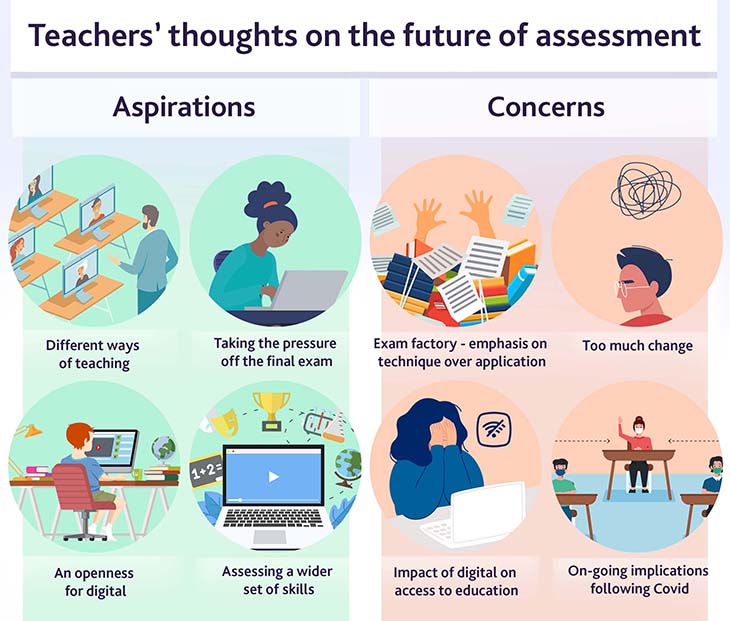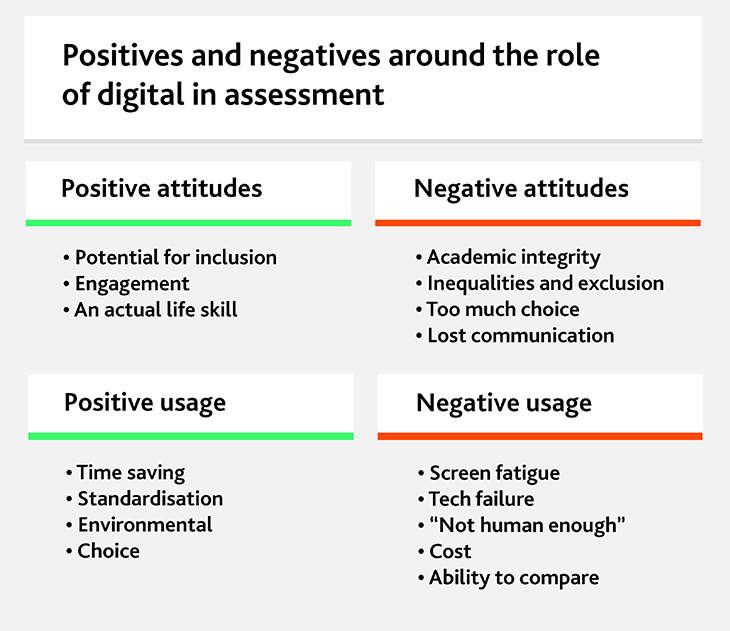As the call and need for digital assessment continues to grow, especially following a year of remote teaching and learning due to the Covid-19 pandemic, colleagues at Cambridge Assessment International Education and our UK exam board OCR are actively exploring what qualifications purely designed for delivery and taking in a digital format might look like.
At Cambridge Assessment we want these new qualifications to use digital in ways that transform assessments and better meet the needs of learners and schools. The link between digital teaching, learning and assessment is a key consideration for us, so that we can achieve our aim of truly exciting and inspiring our learners with digital-first qualifications aligned to a coherent curriculum.
We have been speaking to our schools to understand why they make the choices they do when it comes to assessments and testing. We have been interviewing and listening to teachers around the world and asking them to take us back to basics so we can understand the fundamental 'task' they are looking for an assessment to fulfil for them, and what it tells them about their learners.
Working with schools to understand how they use assessments
We have not asked when schools want to move exams online, or even where we can improve our existing assessment products to make these more digital. Going right back to basics we have been focusing our discussions on teaching and learning cycles and key milestones in their schools, what determines these and what they hope to accomplish by using assessment along the way – and not just Cambridge Assessment products, but all assessments they use (and make themselves).
“We all have many “jobs” to be done in our lives. Some are small (pass the time while waiting in queue); some are big (find your next job).” 1
The methodology we have used in our research maintains that when we choose a product, we (as individuals or organisations), essentially “hire” it to help us do a job. If it does the job well, the next time we’re confronted with the same job, we tend to choose that product again. People “hire” products to get a job done that is often about making progress, changing their lives for the better, improving a situation.”
Our focus for these discussions with schools has therefore been about understanding the true outcome our schools, teachers and learners want to achieve when choosing assessments.
Over the last few months our teams, together with external experts, have enjoyed meeting with teachers and decision makers in 38 schools across 10 different countries, including Malaysia, Pakistan, the UAE, Italy and Brazil, to understand what they use assessment for. And of course, this is a very interesting time to be doing that given the impact the Covid-19 pandemic has had on teaching, learning and assessment. Are the challenges our teachers are confronted with the same? And do they need the same assessment products they used before?
So, what are teachers telling us?
Assessment is being used for a wide range of purposes in schools. It is embedded in almost every aspect of teaching from observation and feedback, quick quizzes, end of topic tests, final stage exams and more. In many cases the same assessment is also being used to get more than one job done.
Our recent interviews with teachers around the world have identified some common aspirations for the future of assessment but also some clear concerns. Many of their hopes might reply upon digital solutions but there are challenges to overcome to reach a point of widespread operation.

There are some common jobs that almost all the teachers with whom we spoke to use assessment for. Such as, to enable timely interventions, give feedback and guidance to students and parents, reinforce learning by means of revision, measure progress through the curriculum and of course a lot of time is spent using assessment to practice for the final end-point assessments.
Some teachers also use assessment to encourage deeper thinking, to recognise effort (not just knowledge), and to develop wider life skills such as collaboration.
There is, however, an acute tension between wanting to go beyond that which is inspired by the end-point assessment, for example to encourage critical thinking and real-world application of skills and knowledge, and the need to cover a great deal of content and focus on end results.
One way teachers would like to do this is through the use of well-designed high quality digital teaching and learning tools and techniques, however they still have to prepare their students for the end exam, and while that is delivered as it is now, they cannot justify the time using digital tools that do not reflect the final mode of assessment. The feedback we have received included comments such as:
- "A results focused education system is causing teachers to narrow their focus on just what is happening with their students and not thinking about how to teach better"
- “The emphasis on exam technique overrides content and joy”.
The next steps
We are about to enter the quantitative phase of our research, to validate at scale the aspirations and hopes for the future of assessment, and the attitudes towards and use of digital in teaching, learning and assessment that we are hearing in our interviews.

The voice of schools will be speaking loud and clear as our teams start their work to define what, why and how we assess in the future and explore how we can use digital to complement teaching and learning by producing assessment products that get today’s jobs done.
_____________________
Reference:
1↩ Know your customers’ “Jobs to be done”, Harvard Business Review, September 2016